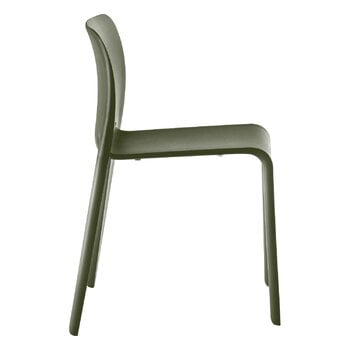The First chair by Magis was designed by the Italian architect and industrial designer Stefano Giovannoni in 2007. Made from polypropylene and glass fibre, the First chair is manufactured using an air-moulding technique, resulting in a streamlined, curved and three-dimensional design. The First chair is lightweight, durable and stackable. It is suitable for both indoor and outdoor use, and its minimalist design pairs perfectly with the tables from the Magis First collection.
First chair, olive green
Magis
Description
The First chair by Magis was designed by the Italian architect and industrial designer Stefano Giovannoni in 2007. Made from polypropylene and glass fibre, the First chair is manufactured using an air-moulding technique, resulting in a streamlined, curved and three-dimensional design. The First chair is lightweight, durable and stackable. It is suitable for both indoor and outdoor use, and its minimalist design pairs perfectly with the tables from the Magis First collection.
Product details (7)
- Colour
- Olive green
- Width
- 50 cm
- Depth
- 52 cm
- Height
- 77.5 cm
- Seat height
- 46 cm
- Material
- Polypropylene with added glass fibre
- Notes
- Suitable for indoor and outdoor use.
- Product ID
Designer
The Italian architect and designer Stefano Giovannoni (b. 1954) studied at the University of Florence in the 1970's. Together with Guido Venturini he founded the production company King-Kong in the early in 1980's. He has designed for example the Girotondo and Mami product lines for Alessi and the Bombo product family for Magis.
View all productsReviews (0)
Sustainability
The Product Sustainability Framework, our criteria of sustainable design, helps you find the most sustainable products in our selection. Read below which sustainability criteria this product has met.
Working conditions & labour 9/9
-
Equal opportunities for all employees
-
Commitment to UN Global Compact, fair compensation for all employees
-
Corporate responsibility requirements defined and communicated for suppliers
-
Systematic work for improved inclusion and well-being in the workplace
-
Transparent supply chain
-
Suppliers' compliance to a code of conduct ensured
-
Direct suppliers audited and certified
-
Compliance to the UN Guiding Principles on Business and Human Rights ensured in the supply chain
-
Support for community involvement in the supply chain
Eco-friendly production 7/9
-
Fair and resource-wise water-use in production
-
No incineration or landfilling of returned items
-
No use of endangered species as materials
-
No direct environmental emissions or waste (excl. GHGs) from production
-
Material-efficient and ecological packaging
-
Positive impact on nature’s well-being through operations that regenerate natural ecosystems
-
No potentially harmful chemicals used in own production
-
The sustainability of direct suppliers' production is addressed and monitored
-
Production and material sourcing that respect biodiversity, animal rights, and natural ecosystems
Climate impact 5/8
-
Company's direct greenhouse gas emissions identified and commitment to reduction
-
Product's carbon impact identified and commitment to reduction
-
Guidance on energy- and eco-efficient use of the product
-
Contribution to climate initiatives beyond the brand’s direct operations
-
100 % renewable energy in own production and operations
-
Low-carbon or compensated transportation
-
Carbon footprint of the product calculated and goals set to reduce it
-
Carbon neutral or carbon negative product
Sustainable materials 6/6
-
Sustainable and long-lasting material choices
-
No harmful or hazardous substances
-
Responsible raw material sourcing and production
-
Materials suited for circularity: monomaterials, recyclable finishings, renewable or recycled contents etc.
-
Ecological materials: natural, biodegradable, recyclable or recycled contents
-
Outstanding materials in terms of innovativeness, responsibility, sustainability and circularity: local production or sourcing, 100 % recycled content, C2C-certification etc.
Circular design 4/5
-
High aesthetic quality promoting long-term use of the product
-
Technically durable product design and material choices
-
Design for enduring life-long quality
-
Design and support for product maintenance, repair and upgradability
-
Innovative circular design solutions: circular service system, resale platform, remanufacturing, collection of used products, etc.





